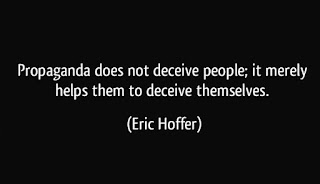Beware of Ulterior Motives
Propaganda - Information,
especially of a biased or misleading nature, used to promote or publicize a
particular political cause or point of view.
Propaganda can be true, but many times false, and is used to push an issue. During World War I the use of propaganda emerged as modern media outlets were on the rise, and was refined into an art. The sole purpose was to spread information (or misinformation) and rumors for political purpose.
There are seven techniques used to spread propaganda:
I have always been amazed at how easily people follow the propagandist. Perhaps when they are unhappy with their own lot in life, it is easier to follow someone who blames others for what they do not have. If they are promising you that they can make your life better if you just follow them, then they can gain popularity. Unfortunately by the time you realize they were false promises made to gain power, it is too late.
I am always hopeful that eventually we will learn from the past; that we will stop looking to improve our life by spreading hatred towards others. However, as long as the power hungry propagandist pushes their agenda, human nature being what it is, I may not live to see it.
But I can dream that someday my grandchildren, and their children, will live in a unified world.
Propaganda can be true, but many times false, and is used to push an issue. During World War I the use of propaganda emerged as modern media outlets were on the rise, and was refined into an art. The sole purpose was to spread information (or misinformation) and rumors for political purpose.
There are seven techniques used to spread propaganda:
- Name Calling: Using negative or discriminatory words to arouse suspicion and prejudice. To create the dislike of a group of people they attack their beliefs, leaders and religion.
- Glittering Generalities: Making generalized statements using slogans or catchphrases. Usually they involve the ideas of love, honor, glory, family values, freedom or patriotism that will inspire pride. The statements say very little so they cannot be proved or disproved.
- Transfer: Using a revered symbol to promote the propagandist's idea to stir up emotions. If they can stir up emotions, then it is difficult for people to think clearly.
- Testimonial: Associating a person of authority to their cause, hoping that it will lead people to follow their ideas.
- Plain Folks: Convincing their audience that they are just like them, using plain language and mannerisms to build trust.
- Bandwagon: Capitalizing on the human desire to be part of the crowd and a member of a winning team. It creates the illusion that there is huge support for the propagandist, hoping that those who are not sure where they stand will join their cause. If they don't it can make them feel isolated.
- Card Stacking: Propagandists use only "facts" that support their ideas. If they can convince their audience that their "facts" are true they can control the beliefs of their audience.
I have always been amazed at how easily people follow the propagandist. Perhaps when they are unhappy with their own lot in life, it is easier to follow someone who blames others for what they do not have. If they are promising you that they can make your life better if you just follow them, then they can gain popularity. Unfortunately by the time you realize they were false promises made to gain power, it is too late.
I am always hopeful that eventually we will learn from the past; that we will stop looking to improve our life by spreading hatred towards others. However, as long as the power hungry propagandist pushes their agenda, human nature being what it is, I may not live to see it.
But I can dream that someday my grandchildren, and their children, will live in a unified world.




Comments
Post a Comment